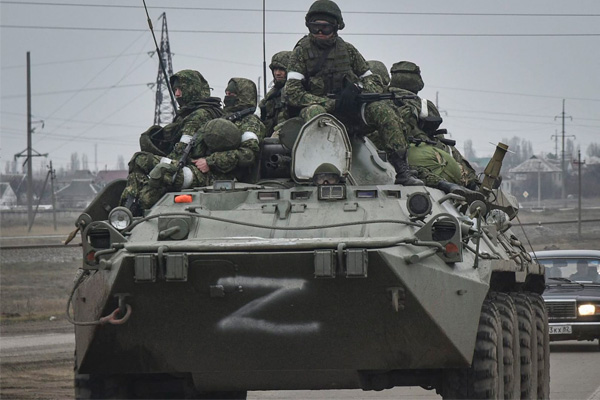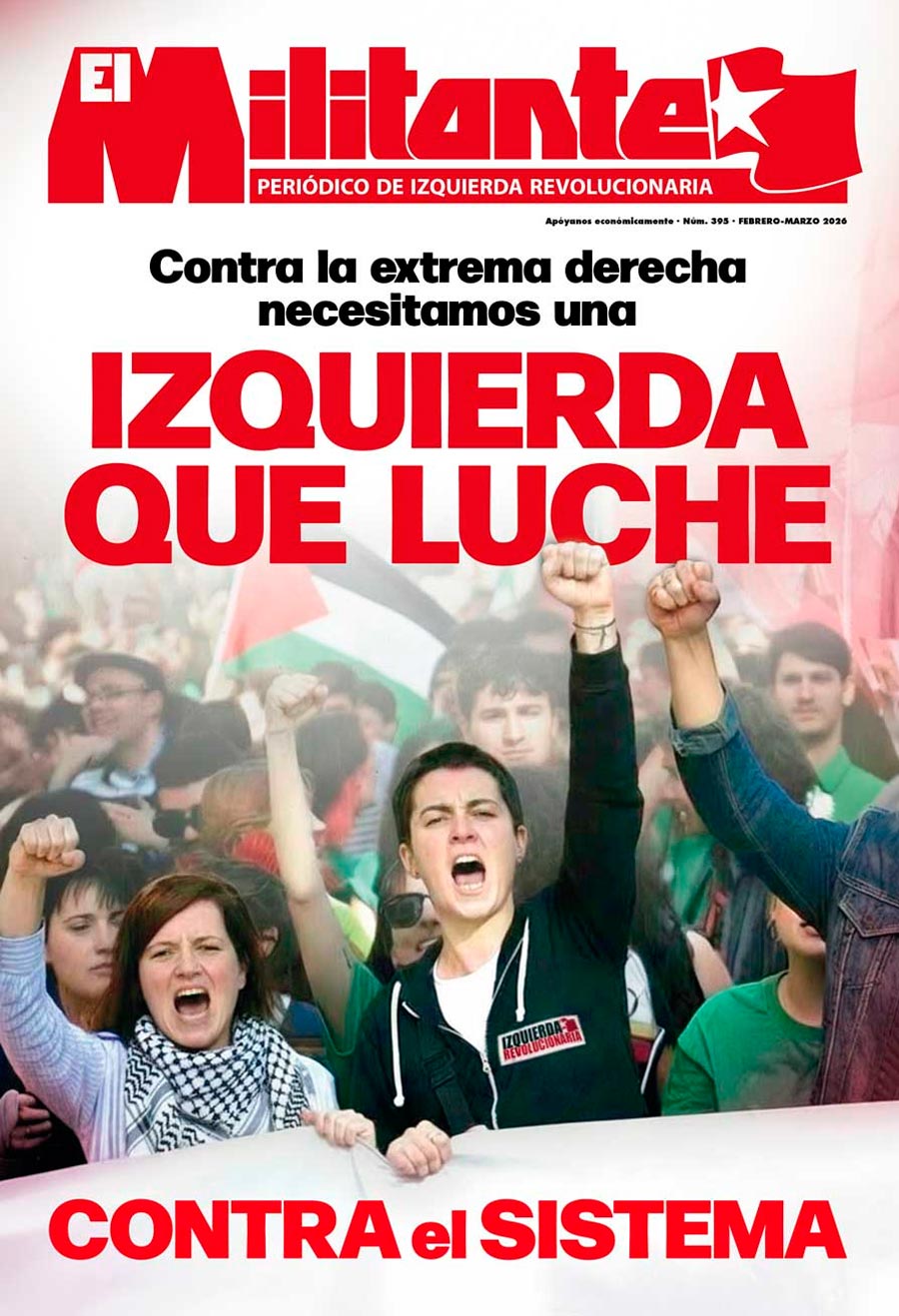Out with Putin's troops, out with NATO, down with imperialist militarism!span>
The invasion of Ukraine by the Russian army, and the militarist response of US and European imperialism, have precipitated the capitalist system greatest crisis since the Second World War. The battered balance of international order sponsored by Washington after the fall of the USSR has collapsed.
The orthodoxy of the reformist left
The terrible images of the bombardments ordered by Putin's regime against Ukrainian cities, the thousands of dead, the destruction of hundreds of military targets and civilian infrastructure, the exodus of four million women, children and elderly people outside the country's borders... are shocking the world. At the same time, the horrors of this war are used by NATO governments to hide their direct responsibility, using a despicable campaign of manipulation.
The traditional social democracy has once again capitulated to its national bourgeoisie, taking on the infamous role of propaganda agency for American and European imperialism. Its aim is obvious: to compact "national unity" and "social peace" with our exploiters at any price.
But this social-patriotic collapse, it must be said honestly, also affects the new reformist left.
From Die Linke AND Syriza to UNIDAS Podemos, pro-NATO subordination is a scandalous fact. By voting in favour of sending arms to the Zelenski government, applauding the economic sanctions against Russia, supporting the announced austerity programmes , they reproduce the war propaganda designed by Washington and Brussels.
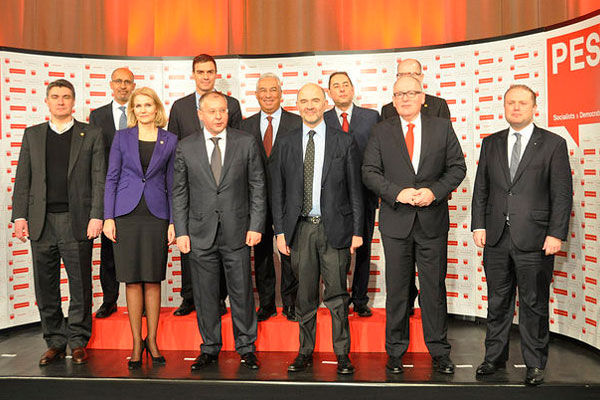
The confusion has reached regrettable extremes. In not just a few publications of organisations claiming to be "revolutionary" one can read that the Ukrainian army, the national guard and the so-called "citizens' militias", nourished by abundant fascist elements among their troops and commanders , and armed and instructed by Western imperialism, are waging a war of progressive "national liberation", and should be supported by the workers of the world. Some even dare to compare this kind of "resistance" to that of the Spanish workers and peasants who took up arms against fascism and fought for the socialist revolution between 1936 and 1939.
Confusing counter-revolution with revolution always leads to disaster. Those who hold this position have renounced a policy of class independence, socialism and internationalism.
Great Russian nationalism and its reactionary role
On the other hand, sections of the Stalinist left around the world regard the invasion of Ukraine as a legitimate action in the face of NATO expansion, unconditionally support Putin, his nationalist and repressive policies, and vehemently deny that the Russian capitalists are pursuing an imperialist goal with the war.
After the USSR disintegration and its capitalist restoration, the neo-liberal policies concocted by Washington, and enthusiastically supported by the Stalinist bureaucrats, sank the living conditions of the Russian people.
As we have pointed out in previous statements , the international correlation of forces underwent a decisive shift in favour of US imperialism. All the promises made to Mikhail Gorbachev that the Atlantic Alliance would not expand eastwards were a swindle . Hungary, Poland, Czech Republic, Slovakia, Bulgaria, Slovenia, Estonia, Latvia, Lithuania, Romania, Albania, Croatia and Montenegro joined NATO between 1999 and 2017, accepting the establishment of US military bases and the deployment of missiles.
As evidenced in negotiations with Moscow last December and January, Washington flatly rejected Russia's demand that Ukraine renounces Atlantic Alliance membership to secure a demilitarised space.
That said, and underlining its enormous importance, to consider Putin's intentions in this war as merely "defensive" is to live in a fairy tale. One need only analyse his inflammatory speeches denying the existence of the Ukrainian nation to understand his true objectives. When Putin calls Lenin's programme and the October Revolution "criminal" for recognising the right to self-determination of Ukraine and the nations that were integrated into the USSR, it shows that he and the capitalists behind him are vehement anti-communists and worthy Great Russian nationalists, heirs of tsarist imperialism.
Competing interests
The war in Ukraine is much more than the Russian military invasion. It is the most momentous event in the confrontation between two imperialist blocs for the domination of global production chains, capital flows, trade routes, key raw materials and areas of geostrategic value.
We know that the double standards and hypocrisy of the US and its European allies know no bounds. Their indignant speeches accusing Putin of "violating international law" come from the same cynics who financed jihadist militias in the Middle East and Central Asia, who dismembered the living body of the Yugoslav Federation and encouraged the terrible massacres in the Balkans, who ravaged Iraq and Afghanistan, Yemen and Libya... and who have caused at least 900,000 deaths and 38 million displaced persons and refugees since 9/11.
However, much has changed in international relations in the last two decades.
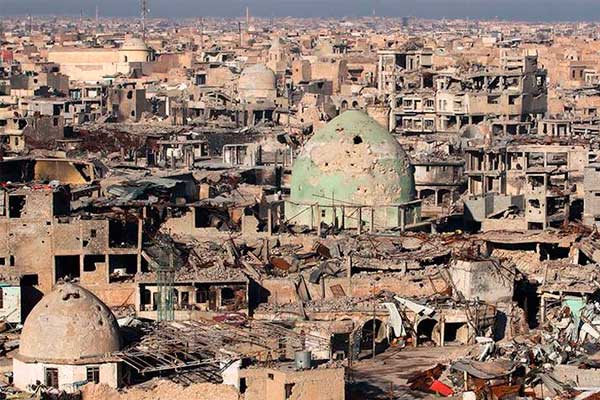
Western capitalism has been plunged into a permanent crisis since 2008, and the US has suffered setback after setback. Its defeats in Iraq, Syria, against Iran, or its resounding collapse in Afghanistan, have exposed the decadence that corrodes the world's leading power. This objective fact is being exploited by adversaries who have grown considerably stronger during the period.
We have analysed in various materials the reasons that have led China to become an economic, financial, technological and military superpower .
Thanks to massive capital investment, China has become the world's factory, producing a third of global manufacturing, 53.3% of steel and 57% of aluminium. The Asian giant accounts for 15.2% of total world exports, ahead of the US (8.45%), Germany (8.1%), and Japan (3.8%) (WTO, 2020).
More scientists and engineers graduate in China today than in the United States, Europe, Japan, Taiwan and South Korea combined. The Asian powerhouse has taken the lead in the development of Artificial Intelligence (AI), with its share of global industrial robot production growing from 3.2% in 2010 to 31% in 2020. The prospect is that the Asian giant could become the world's second-largest semiconductor producer by 2022, behind only Taiwan.
These achievements cannot hide the extreme exploitation of the working class under China's state capitalism, the absence of democratic and trade union freedoms, and the extent of a lacerating inequality: 1% of billionaires owned 30.6% of the country's wealth in 2020 .
China's penetration of the global market is overwhelming. In Latin America, its credits exceed the total granted by the World Bank, the Inter-American Development Bank and other Western imperialist agencies in the last decade. In November 2020 it sponsored the Regional Comprehensive and Economic Partnership Treaty, signed by 15 countries in the Asia-Pacific region with more than 2.2 billion people, about a third of the world economy and a combined GDP of some $26.2 trillion.
In Africa, a key continent for strategic minerals and raw materials, Chinese investments grew by 43% between 2014 and 2018, while those of the US fell by 30.4%, Britain by 26.9% and France by 11.7%.
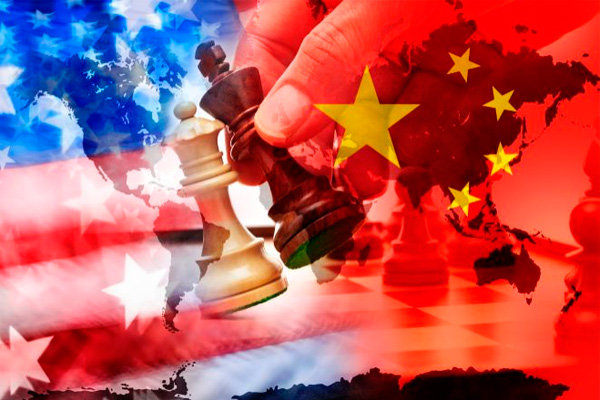
All these facts, and many more that for reasons of space are impossible to cite, show the decline of the US as a hegemonic power. But the White House will never accept a demotion pon the world stage without a fight to the death. Much less lose its decisive influence in the old continent to its adversaries.
China and Russia
Lenin studied the phenomenon of imperialism extensively and described it as the monopoly stage of capitalism. But the development of state-monopoly capitalism and the imperialist struggle cannot be reduced to a simple formula, it includes many elements which are subject to constant transformation: "... under capitalism, a distribution of spheres of influence, of interests, of colonies, etc., is inconceivable except by the strength of those who participate in it, economic, financial, military, etc., strength. And the strength of those who participate in the distribution changes unevenly, since the harmonious development of different enterprises, trusts, industrial branches and countries is impossible under capitalism. Half a century ago Germany was insignificance compared to Great Britain; the same can be said when comparing Japan with Russia. Is it conceivable that in ten or twenty years the correlation of forces between the imperialist powers will remain unchanged? It is inconceivable" .
This is precisely what happened in the 20th century after the two great wars, with the consolidation of American imperialism and the displacement of Britain and Germany. A similar process is currently underway with the emergence of Chinese imperialism and its Russian ally, especially after the Great Recession of 2008.
Marxism explains that in nature as well as in social and economic processes there are never pure and static phenomena.
The correlation between inter-imperialist forces and the class struggle is in permanent transformation. And if we start from Lenin's dialectical analysis we will better understand the contradictions running through world capitalism and the role of Russia.
In the history of capitalism, there have been imperialist powers that did not stand out for their capacity to export capital, a quality that some "theoreticians" claim is indispensable to qualify a nation as an imperialist. The example of Portugal is clear: a backward country, dependent on British imperialism, exploited colonies in Asia and Africa comprising a population twice that of Portugal.
The same can be said of the Tsarist Empire. Its capital export capacity was minimal, its industrial base owed to massive French and British investment, and was intertwined with feudal forms of exploitation in the countryside. This did not prevent the autocracy from militarily and bureaucratically dominating nations and territories, from imperialist plunder of their agrarian production, mineral and energy resources, and from subjecting them to the most ruthless cultural and national oppression.
Today, Russia is a developed capitalist country, where big monopolies dominate the relations of production. It is state-monopoly capitalism, in which the business elite - euphemistically called "oligarchs" by the Western press as if they did not exist in the US or Europe - achieved their position by plundering and privatising the nationalised property that existed under the USSR. This capitalist class has emancipated itself from Western tutelage in recent decades, embraced the Great Russian nationalist creed and, for the sake of expediency, supports Putin's Bonapartist government.
Relying on strong economic growth and enormous military power, including a powerful nuclear arsenal, Putin's regime has substantially altered Russia's role on the international stage to position it as a link in the imperialist chain, albeit hierarchically inferior to other powers.
Since 2008, after the invasion of Georgia to prevent it from joining NATO, it has continued to intervene successfully in the nations of the former Soviet Union or with which it had relations of special strategic interest, such as Syria. Its alliance with China has strengthened markedly since 2014, and Moscow has acted as an economic and military subcontractor to Beijing in Africa , the Middle East and Latin American countries.
The Sino-Russian alliance is based on far-reaching material and geopolitical interests. China's oil consumption accounts for 10 per cent of global oil production and its energy demand amounts to 20 per cent of the total. Russia offers a crucial advantage: the ability to transport Beijing's oil needs by land, bypassing the "funnel" of the Strait of Malacca and the South China Sea through which 80 per cent of China's imports currently pass. The threat that the US fleet could obstruct this sea corridor, especially after the signing of the AUKUS Military Agreement, is not to be taken lightly.
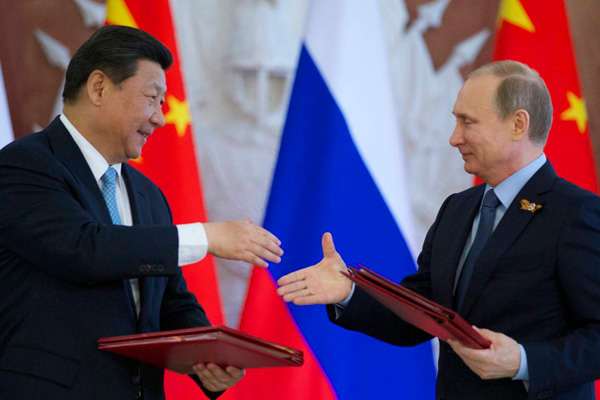
In 2020 Russia became the first supplier of coal, the second supplier of oil , and the third supplier of natural gas and agricultural products to the Chinese market. In 2021, trade between the two nations reached a record high of almost $147 billion (35.8 per cent more than in 2020), with a trade balance in Moscow's favour of $11.757 billion. During President Putin's visit to Xi Jinping weeks before the war, it was officially announced that bilateral trade would increase to $250 billion by 2024.
It is no coincidence that the power of this bloc, and the obvious evidence of American backsliding, has led to a repositioning of many of Washington's old allies. A new division of the world is underway.
Prospects for war
The situation in Europe also has adverse features for the US. The penetration of Chinese capital is so significant that the Biden administration has had to react with the utmost harshness, especially after the humiliating defeat in Afghanistan.
In 2020 China became the EU's largest trading partner, although it had already been biggest Germany's trading partner since 2015. According to data from August 2021, the 30 companies included in the German DAX stock index made around 15 per cent of their sales in China . Trade between China and the 17 Central and Eastern European countries has grown by an annual average of 8% since 2012, reaching $103.45 billion in 2020. The same can be said of Italy and Greece's close relations with the Beijing regime. The data would fill entire pages.
Trump launched the trade war and reaped a resounding failure. But things got really serious during the pandemic, and Biden has pushed the situation in Europe to the limit.
The US is aware of the contradictions among EU members and wants to exploit them by driving a wedge against German power. They have been staunch supporters of Brexit, they have pushed Berlin hard to curb its ties with China and Russia (by paralysing the Nord Stream II pipeline), and they have been completely intransigent in negotiations with Putin over Ukraine.
It is a fact that Biden and his administration have beaten the drums of war into a frenzy because this conflict is allowing them to bring Europe to its knees as an obedient ally in their battle against China and Russia.
The NATO propaganda carefully conceals these facts. Moscow's military intervention, therefore, obeys objective circumstances that have been brewing for years. By pounding a a hard fist on the table and showing their military strength in Ukraine, they can secure an indispensable security belt and consolidate a leading position in world affairs.
It is foolish to think that Putin, his General Staff, and the Russian bourgeoisie, have embarked on the invasion of Ukraine without the approval of the Chinese regime and the guarantee of its backing in the contingencies of war. On the contrary.
Despite the propaganda of Western imperialism about the resilience of the Ukrainian army and national guard, the Russian military superiority is more than evident. More than 500 military targets and 2,000 strategic infrastructures were destroyed, cities like Mariupol were reduced to ruins, many others surrounded and besieged, absolute control in the air, and the use of high-precision hypersonic missiles that have generated tremendous concern in NATO headquarters. Russia has secured all access to the Black Sea and Azov Sea and has made significant advances throughout Donbas.
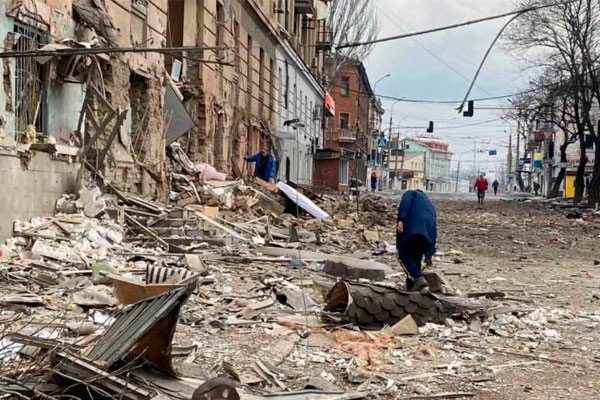
If the Russian regime had put its chips on a lightning victory that would lead it to overthrow Zelensky in a few days and install a puppet government with which it could easily negotiate, the facts have ruled out this hypothesis. But it is absurd to assume that Moscow cannot overrun Kyiv, or that the supposed paralysis in its advance towards the capital is the result of supply problems.
In the conditions of modern warfare, especially urban warfare, resistance against a large army can be prolonged by the massive use of certain equipment: anti-tank, man-portable anti-aircraft systems, snipers, and tactical groups. Nor was the possibility of the Russian army occupying Ukraine a credible option, especially after the experiences of US imperialism in Iraq and Afghanistan. Putin and his General Staff had no such prospect in mind. They aimed to reduce Ukraine's military capability to a minimum, destroy its key economic infrastructure (GDP is estimated to shrink by more than 30% this year), and force an advantageous deal that would ensure Ukraine's non-integration into NATO, its status of neutrality, and even territorial gains in the Donbas.
The US and the EU have made many solemn declarations of support for the Ukrainian people. According to their sources, they have sent more than $2 billion worth of military supplies since the fighting began. But they continue to reject Zelenski's request to close Ukraine's airspace because it would imply a confrontation between NATO and Russia.
The facts are what they are. Biden and the State Department have led the Ukrainian people down a blind alley, and the servile reactionary nationalists who dominate the government in Kyiv and their far-right partners are using them as cannon fodder.
Negotiations for an agreement
As the war enters its second month, Zelenski's government finds itself between a rock and a hard place and Ukraine risks further destruction. That's why the latest negotiations in Turkey on the 29 March have made the possiblities of an agreement even clearer.
To quote from the pro-NATO daily El País: "The Ukrainian negotiating team has stated that Ukraine would seal its neutrality and therefore renounce NATO membership - as demanded by President Vladimir Putin - as long as Kyiv can count on security guarantees from third countries on its territory. For the first time, the Kyiv government has also talked about negotiating the status of Crimea - which Moscow annexed after an illegal referendum in 2014 - albeit within 15 years, and about discussing the status of the Donbas region, but in a meeting between Zelenski and Putin that now seems closer (...). ) For his part, Russian Deputy Defence Minister Alexander Fomin announced that to advance dialogue and 'increase mutual trust', Moscow has decided to 'drastically reduce military operations' in the Kyiv and Chernihiv areas" . Just the day after the meeting in Istanbul, Russian Foreign Minister Sergey Lavrov travelled to China.
This turn of events has greatly displeased Washington. Following Biden's tour of Poland, where he acted as commander-in-chief of Ukrainian forces, accusing Putin of being a war criminal and calling for his overthrow, Secretary of State Antony Blinken has been 'sceptical' of the Istanbul talks, saying there is no sign of 'effective progress'. The same has been said by Boris Johnson, his faithful lapdog.
In short, US imperialism will do everything possible to sabotage a possible agreement and will pull its strings in Ukraine using the numerous points of support it has, both in the government, in the army and amongst the far-right formations. Negotiations will be very tortuous, and the war may escalate at times, but the trends pushing for a deal sooner or later are very powerful.
The other party directly affected is the EU. Although the cracks between its components have welded, and its alliance with the US seems stronger than ever, the internal contradictions are enormous and the differences with Washington's strategy are visible.
The sanctions policy against Russia has had a double-edged effect. Since the beginning of the invasion on 24 February, 380 companies and multinationals have left Russia, several Russian banks have been expelled from the SWIFT system and the country's foreign reserves ($300 billion) have been frozen . As a result, the rouble has at times lost 40% of its value against the dollar, inflation has soared and Russia's GDP could fall by 8-10% by 2022.
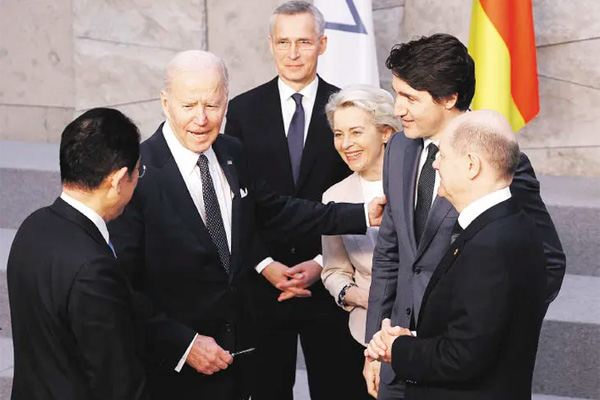
But sanctions have also become a boomerang against the European economy. It is impossible to cut economic ties with Russia and China . If the flow of Russian gas is cut off to Germany, its GDP would plummet by at least 5 per cent, the biggest drop since the Second World War, its industrial sector would collapse and its exports would be hit hard, to the benefit of the US.
Europa Press agency quoted a 30 March statement from the main German trade unions, in which they warned that the imposition of an embargo on energy supplies from Russia would not only lead to company closures and mass layoffs but also the collapse of production chains in Europe, with serious social consequences.
Three-quarters of the gas imported by EU countries comes from Russia , and the US has not yet achieved its goal of cutting off supplies. Moreover, according to the Center for Research on Energy and Clean Air , from 24 February to 30 March, the EU has disbursed a whopping 22 billion euros to Russia: almost 14 billion for gas, more than 7.5 billion for oil and more than 6 billion for coal.
The economic and social effects of sanctions are of course felt in Russia . But in recent years its economy has strengthened its ties with countries outside the Western bloc. Its public debt is limited to 18 per cent of GDP, far lower than that of other European countries, and it has managed to accumulate dollar reserves of more than $630 billion (though half of this is blocked by the West). China accounts for 18 per cent of Russia's total trade, and much of that trade is already in yuan and roubles.
The idea that Russia is isolated is a fantasy. In the last weeks of March, two major Indian state-owned oil companies, Indian Oil Corporation and Hindustan Petroleum Corporation Ltd have together bought almost five million barrels of Russian crude and payment will be made in rupees.
As Rafael Poch writes: "Since sanctions were imposed on Russia eight years ago for the annexation of Crimea, the dollar's share of all international payments has fallen by 13.5 points: from 60.2% in 2014 to 46.7% in 2020 (...) No BRIC has participated in the sanctions against Russia: neither India, nor Bolsonaro's Brazil, nor South Africa, nor the Atlanticist Turkey, nor the Gulf countries, nor of course China... On Wednesday the foreign ministers' congress of the Organisation of the Islamic Conference (57 member countries) refused to join the sanctions against Russia. No country in Africa or West and Central Asia has imposed sanctions on Russia, and in East Asia, only Singapore and Japan have done so, with China and India leading the political response for the rest of the countries. Even more significantly, Saudi Arabia is in talks with China to trade in yuan for payment for its oil. Twenty-five per cent of Saudi oil goes to China. If oil is no longer sold in dollars, doesn't that amount to a bankruptcy of the US economy?" .
The US strategy of prolonging the war at any cost, and dragging Europe into it, is being met by Putin with "heavy artillery". Moscow has demanded payment in roubles for oil and gas supplies to the EU. Germany and other countries have refused for the moment, but if the escalation continues, and a supply cut-off occurs, the current situation of acute stagflation could lead to a gigantic recession in the West, and consequently to an escalation of class struggle all over the world . The prospect of social outbursts is of enormous concern to European governments.
The war in Ukraine and the battle between the powers for the division of the world have unleashed an escalation of militarism. Germany's new 100 billion euro rearmament plan for this year followed the Versailles Summit agreements, in which EU countries pledged to spend 2 per cent of their GDP on defence. China will spend $229.47 billion on its military in 2022, a record after its military budget increased by 6.8 per cent in 2021 and 6.6 per cent in 2020 . And the US will reach a new record military budget ($813 billion), 3 times higher than Beijing's and 10 times higher than Moscow's, with a new 4% increase.
It escapes no one's notice that every dollar and euro invested in these projects of death will come from more social cuts, the destruction of public health and education, the collapse of wages, from the precariousness and impoverishment of hundreds of millions of men, women and children.
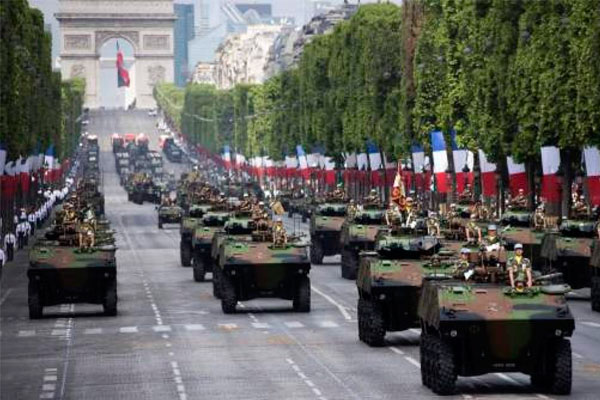
For an internationalist and class-independent politics
We, revolutionary communists, denounce the criminal responsibility of NATO, US and European imperialism in this war. Following Lenin's example, we fight for the national and democratic rights of the Ukrainian nation, historically crushed by tsarist imperialism and Stalinism. But we do not entertain the otherwise reactionary illusion that these rights can be achieved under the Zelensky government and its army. Only the momentum of revolutionary and socialist action by the working class, which breaks all subordination to any of the imperialist blocs, can bring about the genuine national and social liberation of Ukraine.
We demand the immediate withdrawal of Russian troops, and we clearly denounce the Great Russian nationalism of the Putin regime, based on the assertion that the Ukrainian nation does not exist. If he finally succeeds in the territorial annexation of the Donbas after sowing destruction on the country, the national hatred between Ukrainians and Russians will spread for a long time. Only the imperialist bourgeoisie that supports the Kremlin and the fascist formations that are the heirs of Stepan Bandera will benefit from this situation.
Putin has unleashed a brutal repression: almost 15,000 arrests for participating in demonstrations, and numerous criminal charges under the new law allowing prison sentences of up to 15 years for spreading "false information about the war". Of course, anti-Russian militarist propaganda in the West is just as despicable, and censorship is stifling.
The idea of "denazifying Ukraine", knowing all the ties that bind Putin to the European and global far right, is nothing more than a decoy to exploit the sense of humiliation felt for years by the Russian people at the arrogance of American imperialism, and the collective memory of Nazi slaughter during World War II. There is nothing socialist about this demagogy, and if it is able to have any further traction it is thanks to the policies of the leadership of the Communist Party of the Russian Federation (CPRF), which has long since replaced proletarian internationalism with the programme of nationalism and subordination to the Russian state. This is also contributed to by that international neo-Stalinist left which uncritically plays along with the manoeuvres of Putin and his clique.
The imperialist war places the class-conscious workers and youth before a historic obligation: the first thing we must do is to deny support to our own national bourgeoisie and fight capitalist chauvinism with the programme of internationalism and socialism. Workers of all countries unite against the imperialist war!
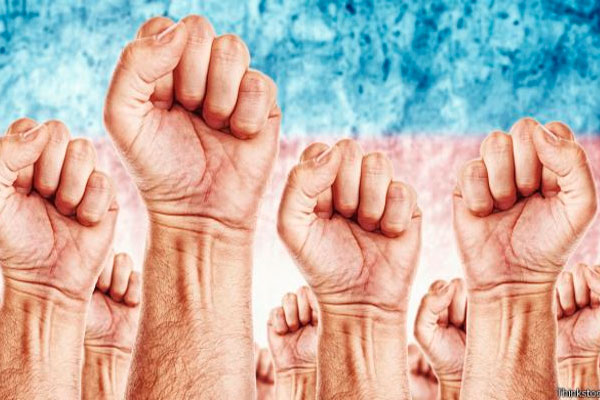
In the face of the capitulation by pro-NATO social democracy and the other formations that shamefully subordinate themselves to it, in the face of the sacred union with the imperialists and the exploiters, we revolutionaries defend a policy of class independence. As Karl Liebknecht said, the main enemy is at home!
The war in Ukraine is the most obvious symptom of the rot in world capitalism, and it will not be the last. The only consistent policy to achieve peace among the peoples is:
NATO and Russian troops out of Ukraine, down with imperialist war!
For the internationalist mobilisation of the working class, for the overthrow of the capitalist governments that have pushed us into this situation, for world socialism!
NOTES
1 To know more read La extrema derecha en Ucrania: mucho más que los nazis del Batallón Azov
2 La invasión rusa de Ucrania y la lucha imperialista por la hegemonía mundial
3 La OTAN y las relaciones entre EE UU y Rusia
4 La lucha de clases en la época de decadencia imperialista
5 Report of Crédit Suisse quote in the 2021 Report of Chinese Politics Observatory: politica-china.org http://bit.ly/3IWzl0r
6 Lenin, El imperialismo, fase superior del capitalismo. Fundación Federico Engels, 2016, p. 177
7 From 1999 to 2020, the Russian GDP has grown globally by 78.3%, thanks to the high price of raw materials. Its natural gas reserves are estimated at about 37.4 trillion cubic meters and produced 638,000 million in 2020, of which it exported a third. As for oil, in 2022 it will produce 11 million barrels a day (it is the third largest producer in the world). Russian gas exports account for 19.14% of the world total, oil exports 12.33% and derivatives 9.75%, and generate 40% of the income of the Russian State. It is also the world's largest exporter of wheat, a large exporter of semi-finished products of iron, nickel and fertilizers, and has 20% of the world export quota for weapons, only behind the US.
8 Moscow has managed increase its presence in Libya, the Central African Republic (CAR), Sudan, Madagascar, Mozambique, Mali and Burkina Faso. From 2015 to 2019, Putin signed 19 military cooperation agreements between Russia and African countries. It is building a nuclear power plant in Egypt and in negotiations to build others in Ghana and Nigeria.
9 The "Power of Siberia 2" gas pipeline, with a capacity to pump 50,000 million m³ to eastern China, will soon come into operation, and the construction of "Power of Siberia 3" has been announced for the next two years. Meanwhile, Russian and Chinese companies are building a gas liquefaction plant in Yamal (northwest Siberia) valued at 27,000 million dollars.
10 Relaciones entre China y Alemania, un complicado acto de equilibrio
12 The US Treasury Department is authorizing the use of these reserves by the Russian Central Bank to pay debt maturities, thus avoiding a possible suspension of payments with unforeseeable consequences for the world economy.
13 Not even the US can do it completely, having excluded the import of uranium from them.
10 This is indicated by the European Statistical Office (Eurostat) based on 2019 data. Finland and Latvia buy, respectively, 94% and 93% of their natural gas from Russia. In Estonia and Bulgaria the percentages are 79% and 77%. Slovakia (70%), Czech Republic (66%), Austria (64%), Hungary (40%), Slovenia (40%), Poland (40%). Germany is Gazprom's main customer: In 2020, it bought 46 billion cubic meters of gas from it.
14 ¿Cuánto ha pagado la UE a Rusia por sus recursos desde el inicio de la guerra en Ucrania?
15 But sanctions have another political effect. The latest February poll by the Levada Institute indicates that the president's approval rating grows to 71%, the highest since May 2018; 58% of the population approves the intervention in Ukraine against 23% who oppose it, although among young people between 18 and 24 years of age, only 29% support the conflict and 39% oppose it. (Survey by Levada Institute UKRAINE AND DONBASS)
17 The UN General Secrtary, António Guterres, warned at the beginning of March that the war in Ukraine could result in "a hurricane of famine" in many countries. "Grain prices have already exceeded those of the early Arab Spring and food riots of 2007-2008."
18 Arms companies are obtaining great profits with the war. According to a study by the National Autonomous University of Mexico, its profits have increased by 10% from February 22 to March 12, 82,000 million dollars in profits. Empresas de armamento aumentan ganancias con conflicto en Ucrania






